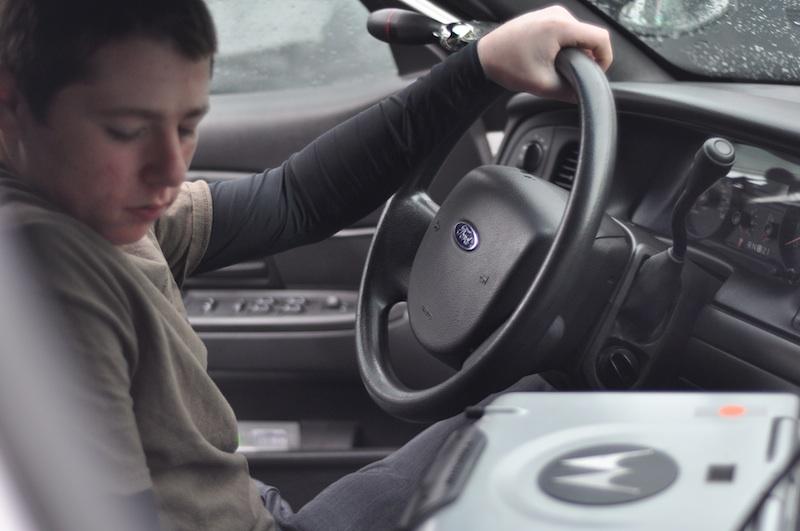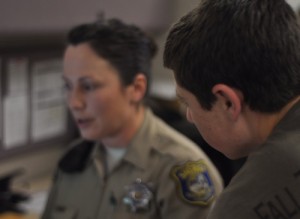
At 6:45 p.m. on New Year’s Eve, junior Zac Burke ducked into a police car. But not the back: Burke rode shotgun.
Many of his friends were celebrating at a party on Prospect Road, a little way down from the Santa Clara County Sheriff’s Office, but Burke had different plans. He spent the final day of 2012 chasing down potential stolen vehicles, helping administer Breathalyzer tests and busting wild parties — including the one on Prospect.
The deputy who Burke accompanied had been called in due to reports of fighting. When the two and other officers arrived, the officers asked Burke to stand back. But that didn’t stop Burke’s friends from giving him an interrogation of their own.
“A bunch of people come to me and are like, ‘Oh, Zac, are you a police?’ And I said, ‘No, dude, I’m just with them,’” Burke said, animated. “‘Are you a police?’ ‘No, dude, I just told you I’m just with them!’ ‘Oh, I know, but are you a police?’ ‘No, dude, go home — but donít drive.’”
Burke is not a policeman — at least, not yet. But he has dreamed of working in law enforcement since childhood, and, through the Sheriff’s Office Teen Community Police Academy, he has come one step closer to upholding the peace.
The Academy
The Police Academy runs two 10-week sessions a year. Burke participated in the fall of 2012, attending classes every Wednesday night from the beginning of October until his graduation in December.
After filling out an application and being selected, Burke joined around 20 other high school students in attending lectures taught by four officers. Students learned to conduct traffic stops and operate handcuffs; witnessed a bomb squad demonstration; and spent one Saturday morning firing officers’ duty weapons at the gun range. They also participated in ride-alongs with officers, like the one Burke completed on New Year’s Eve.
Field trips included outings to the coroner’s office and the Santa Clara County Jail. Burke recalls walking down the hallway of the jail with criminals shouting profanities at him and his classmates. There was one inmate who stood out to Burke: while his cellmates were up at the bars, he remained calmly at the back of the cell.
“I looked at him in the eye as we were walking, and he told me simply to stay in school,” Burke said. “Not all people in there are bad. Actually, most of the people in there aren’t bad. They’ve just made bad choices.”
Broken windows, broken family
Burke’s earliest encounters with policemen were anything but positive. His parents divorced when he was eight, and it was a difficult transition for him to make; despite being on medication for depression and anxiety, he sought an alternate method to express his emotions.
His parents argued often, but Burke didnít have that luxury. So he broke the windows of his Sunnyvale home instead.
“The cops often had to come over to set me straight. And instead of being understanding, they were just kind of there yelling at me,” Burke said. “And part of me said … maybe if I become a cop, I’d be more understanding of this, and I could help people more than intimidate them.”
When he reached middle school, Burke’s family decided his behavior needed a change.
“It was hard to see him struggling, not really being able to handle life in a way that was constructive,” said Kim Rappaport Burke, Burke’s mother. “Raising him was not easy, but he turned his life around.”
For sixth and seventh grade, he relocated to Forest Heights Lodge, a treatment center in Colorado. The therapeutic environment, according to Burke, played a key role in helping him turn his life around.
After a few more school changes, Burke arrived at MVHS for his freshman year. As an underclassman, he faced bullying so severe that the perpetrator was expelled.
“Freshman year, I was kind of annoying, I was a little kid thinking I was a big kid. But I think I’ve changed that. I think Iíve matured very nicely,” Burke said. “And I still have issues with people who don’t agree with what I stand for … but I just ignore them.”
“I still struggle with some problems, but I talk about them now, I don’t act them out — we still have windows in this house,” Burke said. “I haven’t done anything since I was nine or 10, but it seems sometimes like yesterday, and when I look back on it, I think, ‘Wow, that was me.’”
One of Burke’s mentors, Deputy Sheriff Jennifer Toomey, feels that the challenges Burke has had to face will, in the long run, serve as an asset.
“Kids like Zac, or kids like some other people that I know who are deputies now, that have speckled pasts — they’ve dabbled into a little bit of trouble here and there — they make really good cops generally,” Toomey said, “because when they become a cop and talk to other kids who are in a similar type of trouble, they understand where they’re coming from.”
In her years of involvement with the Teen Academy, Toomey has encountered only three students who were serious about a future career in law enforcement. Burke is one of them.
Beyond the badge
On a recent Thursday evening, Burke and his mother attended a showing of “Heroes Behind the Badge,” a documentary that details the sacrifices made by policemen.
“It was incredibly powerful hearing that a police officer in this country dies every 54 hours. That, to me, hit home when I thought about him being put in that danger every day,” Rappaport Burke said. “I did ask him if there was anything else I could talk him into doing, but he’s got his mind set on it, and there’s nothing I’m going to do to change it.”
Currently, Burke is applying to the County Sheriff’s Office Youth Cadet program. If he is selected, he will receive a uniform as well as the opportunity to participate in alcohol and tobacco sting operations and law enforcement at county fairgrounds. For his 18th birthday, he hopes to complete a ride-along in Oakland.
His end goal is to become a police officer somewhere in this area, where he has lived for the majority of his life — where he has grown from being an eight-year-old with a temper into a young adult with dreams of serving the law.
Burke recalls an encounter with a police officer from his younger, more rash days that left a strong impression. He was one of the few officers who, like Burke one day hopes to, approached him with understanding rather than intimidation.
“I remember one time a cop kind of got down on his knee and just patted me on the back and asked me in a soft tone, ‘What’s going on? Why are you acting like this?’” Burke said. “He actually seemed to care, which was a big thing.”
More recently, Burke saw the same officer at the Sheriffís Office. He couldn’t remember the officer’s name, so he didn’t say hello.
“But I’ll see him again,” Burke said. “And I’ll thank him.”







